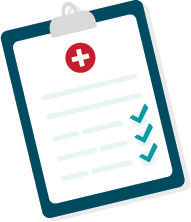
PRIORITIZE THE BASICS
Begin with the basics, ensuring that students get nutritious meals, sufficient sleep, and physical activity. All of these are key to academic and social success. Studies show that children who eat a nutritious breakfast function better at school. Many children qualify for free or reduced-price food at school, including breakfast. The forms for these services can be completed at the school office.
Getting enough sleep is also critical to staying healthy and thriving at school. Not getting enough sleep can affect memory, concentration, creativity, and learning. Lack of sleep is linked with lower academic performance, school attendance, and tardiness.
STAY UP TO DATE ON CHECKUPS AND IMMUNIZATIONS

If your child has not had a well-child checkup in the last year, schedule a back-to-school physical, including any needed vaccinations. If your child is playing a sport, get a pre-participation (sports) exam. Your pediatrician can help you update any forms your child’s school may need in case of a medical emergency.
TUNE IN TO YOUR CHILD’S MENTAL HEALTH
Many children and teens have experienced mental health struggles over the past few years. Let your child know it’s ok to talk about how they’re feeling and make it safe for them to discuss tough issues with you. Kids often avoid discussing touchy subjects, especially if they expect to be judged, lectured, or punished. If you haven’t already made this clear, affirm that your child can tell you anything. Emphasize that these conversations will take place in a judgment-free zone, and really listen to what your child is saying.

Stay on the lookout for any changes in behavior that worry you or any signs of anxiety, depression, or distress. If you have a firearm in your home, make sure to lock it up and store the ammunition separately. The risk of suicide is higher for children and teens who live in a home where guns are stored loaded or unlocked.
Try to prioritize family meals and self-care breaks, like taking walks together. These can be great opportunities to talk. Ask your pediatrician if you are unsure if your child needs help or how to start a discussion. Schools may also offer sources of mental health support.
PLAN FOR MINDFUL MEDIA USE

The change in routine is a good time to create or update your family media plan so you can help your child balance screen time with sleep, exercise, and other healthy activities. Help your children choose high-quality programs or games and help them recognize sites that promote false information.
This is also a good time to engage in conversations with your child about if and how they use social media, which can be beneficial but also problematic for some. Doctors are still learning how social media can affect human health, especially among children and teens.



